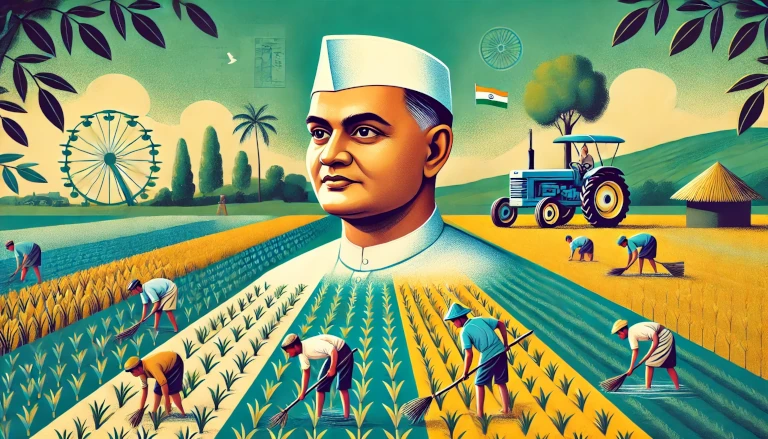Prime Minister Lal Bahadur Shastri and His Efforts to Promote Farming: A Legacy That Shaped Indian Agriculture 🌾 – Lal Bahadur Shastri, the second Prime Minister of India, played a pivotal role in the agricultural development of the country. His leadership came at a crucial time when India was facing severe food shortages. Through his visionary policies and efforts, Shastri not only uplifted the farmers but also laid the foundation for India’s Green Revolution. His slogan “Jai Jawan, Jai Kisan” became the mantra for agricultural and national growth. Let’s explore how Shastri’s leadership transformed Indian farming and why his contributions remain significant even today.
The Agrarian Crisis of the 1960s 🛑🌾
India, during the 1960s, was grappling with severe food shortages. The nation was largely dependent on food imports, and agriculture, the backbone of India’s economy, was facing stagnation. This was a time when the country needed strong leadership to address the agrarian crisis.
Shastri understood that to achieve self-sufficiency in food production, empowering farmers and modernizing agriculture was critical. His government took several initiatives that prioritized farming and rural development.
Shastri’s Green Revolution Vision 🌱
One of Shastri’s most significant contributions was his push towards what later became known as the Green Revolution. Although the actual term “Green Revolution” was coined after his tenure, it was Shastri’s groundwork that set the stage for this transformation. His policies included:
- Promotion of high-yielding variety (HYV) seeds: These seeds played a vital role in boosting crop production, especially in wheat and rice.
- Increased use of chemical fertilizers: Shastri’s government encouraged farmers to use fertilizers to enhance soil fertility and productivity.
- Irrigation and water management: Recognizing the importance of irrigation, his administration worked on expanding irrigation facilities to ensure that crops received adequate water, especially in drought-prone regions.
‘Jai Jawan, Jai Kisan’ – A Slogan that Resonated Across India 🌾👩🌾
In 1965, during the Indo-Pak War, Shastri coined the slogan “Jai Jawan, Jai Kisan” (Hail the Soldier, Hail the Farmer). This slogan symbolized the importance of both the military and the farmers in the nation-building process. It uplifted the morale of the nation and emphasized the role of farmers in ensuring the country’s self-sufficiency.
For Shastri, the farmer was as important as the soldier in protecting the nation. He believed that food security was integral to national security. This idea resonated deeply with the Indian public, further solidifying his legacy as a leader who genuinely cared for the welfare of farmers.
Agricultural Policies Under Shastri’s Leadership 📜🚜
Lal Bahadur Shastri was instrumental in initiating a series of reforms that directly impacted the agriculture sector. Some of his key agricultural policies include:
- Land Reforms: Although land reforms had begun before Shastri’s tenure, he took decisive steps to accelerate the redistribution of land to small farmers. This aimed at reducing rural poverty and empowering marginalized farmers.
- Cooperative Farming: Shastri advocated for cooperative farming, where farmers pooled resources and land to increase agricultural productivity. This not only helped increase output but also promoted collective welfare.
- Promotion of Dairy Farming and White Revolution 🐄: Shastri’s government initiated measures to boost milk production, which eventually led to India’s White Revolution. His support for dairy cooperatives, particularly the formation of the National Dairy Development Board (NDDB), laid the groundwork for India’s emergence as the largest milk producer in the world.
- Support for Agricultural Research: Shastri realized that modern science could play a transformative role in farming. Under his leadership, the Indian Council of Agricultural Research (ICAR) received increased attention, promoting agricultural research and development.
The Legacy of Shastri’s Agricultural Vision 🌾🛠️
Lal Bahadur Shastri’s contributions to agriculture have had a lasting impact. His policies laid the foundation for India to become self-sufficient in food production. The Green Revolution, which gained momentum after his untimely death, owes much of its success to the groundwork laid by his government.
Shastri’s belief in empowering farmers and his commitment to rural development still resonate today. Modern-day India, with its robust agricultural economy, stands as a testament to Shastri’s vision. His contributions serve as a reminder that sustainable agricultural growth is vital for a nation’s overall prosperity.
A Tribute to Lal Bahadur Shastri’s Efforts in Promoting Farming 🚜🇮🇳
Lal Bahadur Shastri was more than just a political leader; he was a champion for the common man, particularly the Indian farmer. His forward-thinking agricultural policies not only addressed immediate food shortages but also ensured long-term self-reliance. His legacy continues to inspire policymakers and farmers alike, as they strive to build on his vision of a prosperous and self-sufficient India.
Shastri’s efforts in promoting farming are a shining example of how strong leadership can transform an entire sector. His emphasis on farming, innovation, and self-sufficiency continues to guide India’s agricultural policies, making him a revered figure in Indian history.
Discover more from Green Ecosystem - Renewable Energy, Agriculture, and Environmental Sustainability
Subscribe to get the latest posts sent to your email.


